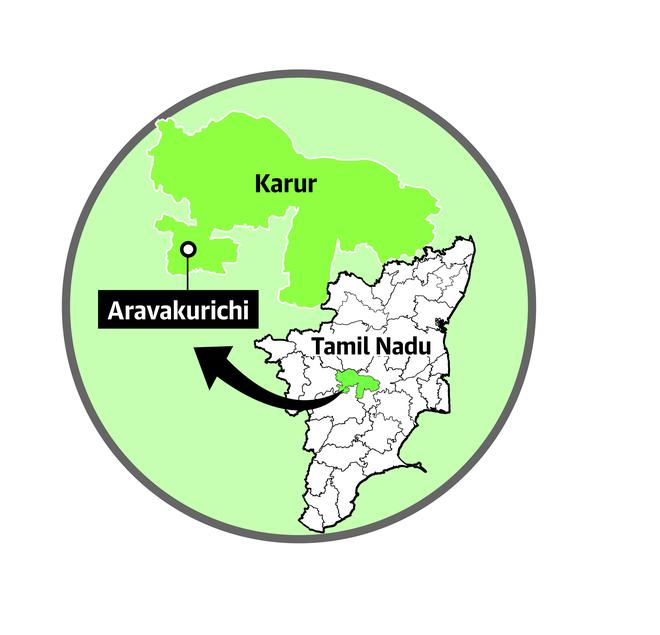Aravakurichi in Karur district is deemed Tamil Nadu’s ‘Moringa Central’. About 2,984 hectares (approximately 7,373 acres) is under Moringa oleifera cultivation in this small panchayat town. It presents a sea of green to visitors for at least eight months of the year as the trees’ flavoursome drumstick ( murungakkai) pod and its by-products get ready for despatch.
“Of the 12,308 farmers in this area, at least 10,000 are moringa growers. It is a low-maintenance crop that does not require much irrigation, and therefore suits this area’s rocky soil conditions. We harvest at least 100 tonnes of moringa per day during peak season (July to September),” said R. Kannan, Assistant Agricultural Officer, Agri-Business Department, Aravakurichi branch.
A storehouse of nutrients, the drumstick is a common part of the daily diet in southern India. Moringa leaf ( murunga keerai) is also valued for its medicinal qualities, while its seed oil is of late making inroads into in the international market as a nutritional supplement.
A recent Global Markets Insights report projects the moringa ingredients market to be worth $10 billion by 2025, with North America, Europe and Asia-Pacific driving the demand.
Looking for right price
But Aravakurichi isn’t exactly sitting on an agricultural jackpot, because oversupply has eroded farmers’ earnings. “We advise our members to avoid harvesting their crop if the market does not deliver a good price. Instead, the pods are left to go to seed for oil extraction,” said M. Saroja, who heads the Karur Moringa and Vegetable Production Farmers Producer Company (KMVPFPC).

The KMVPFPC, which groups 400 moringa cultivators in and around Aravakurichi, is an early adopter of organic farming, based on the methods advocated by agricultural scientist late G. Nammalvar. “From ₹60 in March, the price of moringa per kg has dropped to ₹8, and may come down even further this year. Our farmers do not approach the market unless they get at least a minimum support price of ₹25,” pointed out Ms. Saroja.
Value addition
A State government supply chain management initiative at an investment of ₹2.3 crore to create a drumstick processing unit is yet to materialise. Many farmers and agri start-ups in the region have instead started small ventures to add value to the moringa.
The KMVPFPC mills around 100 kg of moringa seed oil a month and retails it through word of mouth and the company’s Facebook page. “We want to operate on a small scale so that the local farmer can get a good deal. The [COVID-19] lockdown has also changed our business model. We have diversified our product range and started manufacturing value-added products from flowers such as Avarampoo (Tanner’s cassia), ‘ Elantha Pazham’ (Indian jujube) and neem,” she said.
Special economic zones for moringa (as proposed in Madurai) will only create a further imbalance, say local entrepreneurs. “Big business houses and seed retailers will enter the sector and the small farmers will be sidelined. Besides, the industrialisation of agriculture will only lead to environmental damage,” felt Ms. Saroja.
Switching to organic
Most of Aravakurichi’s farmers still grow moringa through conventional methods, using chemical inputs. “Since our produce lacks organic certification, we are losing out on a huge potential customer base in North America and Europe. To set this right, we have started offering incentives to farmers who want to go organic, and are signing yearly contracts with them. So far, 100 farmers have signed up to cultivate moringa through organic farming,” said Mr. Kannan.
But this too will need time. “It takes at least three years for a farm’s soil quality to be arable for organic farming. So, we are looking at a wait of at least five to 10 years before Aravakurichi’s organic moringa export market can take shape,” he said.
The official said moringa seeds, which do not require organic certification, have found buyers from Asian pharma companies, making up for the export shortfall of the drumstick pods. “Japanese and Chinese companies buy the seeds through their trading agents in Aravakurichi directly; around five to six tonnes of seeds are exported per month,” said Mr. Kannan.
For small-scale domestic moringa traders like Sheikh Fareed, the crop is always on a roller coaster price ride. “This business is like a lottery. We will buy the moringa for ₹20,000 and it will be resold for ₹30,000. We earn around ₹10,000 on each lorry load of moringa, but only during the peak season,” said Mr. Fareed.
There is a second, more profitable business sustaining the moringa farmers. “Farmers here are all engaged in rearing the ‘semmari’ breed of goats. They graze on moringa leaves, but do not destroy the actual crop. So, a moringa farm doubles as a secure grazing ground for the livestock, and helps farmers earn a dual income,” explained Mr Kannan.
In any case, moringa is here to stay in Aravakurichi. “We have tried to make farmers switch to papaya, guava and figs, but after one harvest, they just go back to moringa,” he added.







